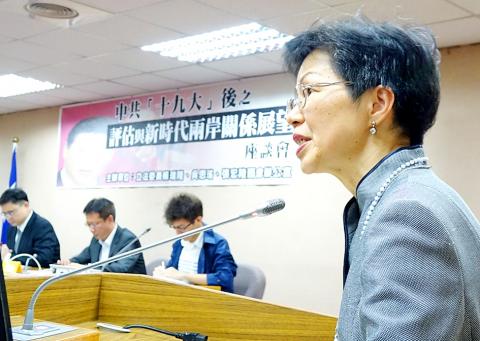Beijing is to exert more pressure on Taiwan by stepping up its dual strategy of draining the nation of its workforce while coercing Taiwan by diplomatic means, Mainland Affairs Council (MAC) Minister Katharine Chang (張小月) said yesterday during a forum discussing cross-strait relations following the Chinese Communist Party’s 19th National Congress.
While Beijing has not changed its policy toward Taiwan, despite incorporating Chinese President Xi Jinping’s (習近平) cross-strait “family” motif during the congress, it will continue its “dual strategy of courting and coercing,” Chang told the forum organized by Democratic Progressive Party (DPP) lawmakers at the Legislative Yuan in Taipei.
“Beijing will be softer on its soft strategy and tougher on its hardline strategy,” she said.

Photo: Chu Pei-hsiung, Taipei Times
It would continue the “one generation and one stratum” policy to attract Taiwan’s younger generation and the grassroots stratum with occupational, educational and other preferential treatment in a bid to assimilate Taiwanese, Chang said.
On the diplomatic front, Beijing will redouble its efforts to impose the “one China” principle on the international community and curb Taiwan’s international presence, she said.
The cross-strait relations have moved to a new phase after the DPP administration took office in May last year, and both sides have to form a new mindset and put aside disputes to develop a peaceful and prosperous relationship, she said.
President Tsai Ing-wen (蔡英文) has reiterated that her administration would not change its goodwill or promises toward Beijing and would not return to confrontation or succumb to pressure, Chang said, calling on Beijing to start a friendly dialogue with Taipei.
Council Deputy Minister Chiu Chui-cheng (邱垂正) said Xi has not proposed any essential Taiwan policy, which might be put forward during his second term, adding that the council would be closely watching Beijing’s moves.
National Taiwan University politics professor Chen Ming-tung (陳明通) said there would not be dramatic changes to cross-strait relations in the next 30 years if Taiwan can maintain the strategic balance between Taiwan, China and the US.
Over a multilateral interaction spanning six decades, a strategic balance has been achieved between Taiwan, the US and China, with Taiwan achieving a peaceful autonomy, China preventing Taiwan from seeking de jure independence and the US preventing Taiwan from becoming a Chinese military base, Chen said.
Taiwan has to keep that balance while seeking to develop a new mode of cross-strait interaction, Chen said.
Tamkang University politics professor Chang Wu-Ueh (張五岳) said China is reshuffling its Central Leading Group for Taiwan Affairs, which is expected to be led by experts of China-US relations including Chinese Vice Premier Wang Yang (汪洋) and Chinese Ambassador to the UN Liu Jieyi (劉結一).
China-US relationship is the most critical bilateral relations to cross-strait and international relations, and Beijing’s new leadership group is the one that is most familiar with the US in history, and Taiwan needs to prepare for possible effects on cross-strait relations, Chang said.

Chinese Nationalist Party (KMT) Chairman Eric Chu (朱立倫), spokeswoman Yang Chih-yu (楊智伃) and Legislator Hsieh Lung-chieh (謝龍介) would be summoned by police for questioning for leading an illegal assembly on Thursday evening last week, Minister of the Interior Liu Shyh-fang (劉世芳) said today. The three KMT officials led an assembly outside the Taipei City Prosecutors’ Office, a restricted area where public assembly is not allowed, protesting the questioning of several KMT staff and searches of KMT headquarters and offices in a recall petition forgery case. Chu, Yang and Hsieh are all suspected of contravening the Assembly and Parade Act (集會遊行法) by holding

PRAISE: Japanese visitor Takashi Kubota said the Taiwanese temple architecture images showcased in the AI Art Gallery were the most impressive displays he saw Taiwan does not have an official pavilion at the World Expo in Osaka, Japan, because of its diplomatic predicament, but the government-backed Tech World pavilion is drawing interest with its unique recreations of works by Taiwanese artists. The pavilion features an artificial intelligence (AI)-based art gallery showcasing works of famous Taiwanese artists from the Japanese colonial period using innovative technologies. Among its main simulated displays are Eastern gouache paintings by Chen Chin (陳進), Lin Yu-shan (林玉山) and Kuo Hsueh-hu (郭雪湖), who were the three young Taiwanese painters selected for the East Asian Painting exhibition in 1927. Gouache is a water-based

Taiwan would welcome the return of Honduras as a diplomatic ally if its next president decides to make such a move, Minister of Foreign Affairs Lin Chia-lung (林佳龍) said yesterday. “Of course, we would welcome Honduras if they want to restore diplomatic ties with Taiwan after their elections,” Lin said at a meeting of the legislature’s Foreign Affairs and National Defense Committee, when asked to comment on statements made by two of the three Honduran presidential candidates during the presidential campaign in the Central American country. Taiwan is paying close attention to the region as a whole in the wake of a

OFF-TARGET: More than 30,000 participants were expected to take part in the Games next month, but only 6,550 foreign and 19,400 Taiwanese athletes have registered Taipei city councilors yesterday blasted the organizers of next month’s World Masters Games over sudden timetable and venue changes, which they said have caused thousands of participants to back out of the international sporting event, among other organizational issues. They also cited visa delays and political interference by China as reasons many foreign athletes are requesting refunds for the event, to be held from May 17 to 30. Jointly organized by the Taipei and New Taipei City governments, the games have been rocked by numerous controversies since preparations began in 2020. Taipei City Councilor Lin Yen-feng (林延鳳) said yesterday that new measures by